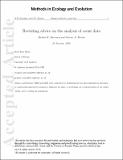Revisiting advice on the analysis of count data
Abstract
1. O’Hara and Kotze (2010; Methods in Ecology and Evolution 1: 118‐122) present simulation results that appear to show very poor behaviour (as judged by bias and overall accuracy) of linear models (LMs) applied to count data, especially in relation to generalised linear model (GLM) analysis. 2. We considered O’Hara and Kotze’s (2010) comparisons, and determined that the finding occurred primarily because the quantity that they estimated in their simulations of the LM analysis (the mean of a transformation of the count data) was not the same quantity that was simulated and to which the results were compared (the logarithm of the mean of the count data). We correct this discrepancy, re‐run O’Hara and Kotze’s simulations, and add additional simple analyses. 3. We found that the apparent superiority of the GLMs over LMs in O’Hara and Kotze’s (2010) simulations was primarily an artefact of divergence in the meanings of results from the two analyses. After converting results from LM analyses of transformed data to estimators of the same quantity as provided by the GLM, results from both analyses rarely differed substantially. Furthermore, under the circumstances considered by O’Hara and Kotze, we find that an even simpler implementation of LM analysis, inference of the mean of the raw data, performs even better, and gives identical results to the GLM. 4. While the analysis of count data with generalised linear models can certainly provide many benefits, we strongly caution against interpreting O’Hara and Kotze’s (2010) results as evidence that simpler approaches are severely flawed.
Citation
Morrissey , M B & Ruxton , G D 2020 , ' Revisiting advice on the analysis of count data ' , Methods in Ecology and Evolution , vol. Early View . https://doi.org/10.1111/2041-210X.13372
Publication
Methods in Ecology and Evolution
Status
Peer reviewed
ISSN
2041-210XType
Journal article
Description
Funding: MBM is supported by a University Research Fellowship from the Royal Society (London).Collections
Items in the St Andrews Research Repository are protected by copyright, with all rights reserved, unless otherwise indicated.

